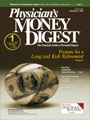Prepare for a Long and Rich Retirement
BusinessWeek
The good news is that life expectancy continuesto lengthen for Americans. Fueled byhealthier lifestyles and advanced medicalprocedures, today's healthy 60-year-oldcould live to the ripe old age of 90. The bad news isthat retirement nest eggs, according to a recentreport, now have to be bigger becausethey have to last longer.
Enlightening Example
BusinessWeek
To illustrate how the retirement numbers work, thearticle offers an example of a fictitiouscouple who would like to retire 1 year from now, whenthe husband is age 60 and his spouse 59. Their currentannual household income is $200,000. They have$500,000 in 401(k) accounts, $100,000 in a Roth IRA,and $200,000 in a taxable investment account. Thecouple expects a tax-free profit of $500,000 from thesale of their principal home and owes $100,000 ontheir second home in North Carolina.
If you add the numbers together, the couple has anest egg of approximately $1.2 million. That maysound like a lot, but according to the article, thatwould leave the couple with an annual income ofbetween $60,000 and $90,000 in current dollars forclose to 37 years, allowing approximately 3% annuallyfor inflation. At best, that's only 45% of their preretirementearnings, far short of the 70% usually recommendedby financial advisors.
Of course, this example assumes the couple's portfoliowill earn a 7% annual return and that their withdrawalrate will be 5% annually. If the withdrawalrate is bumped up to 6%, their nest egg will last 25years. Increase the withdrawal rate to 7%, and thesavings will be depleted in only 20 years. The bottomline is that early retirement can be costly.
First, if you retire at age 60, you've still got a fewyears before your Social Security benefit kicks in. Ifyou decide to take your Social Security benefit early,you could forfeit as much as 25% of your full retirementbenefit. And since Medicare doesn't take effectuntil you turn age 65, medical insurance will cost youhundreds of dollars each month.
Retirement Remedies
There are ways the couple could give their annualretirement income a shot in the arm. For starters, thearticle suggests working full-time for a few more years;the impact can be significant. The couple would delaywithdrawals while continuing to build their nest egg.They would also be able to retain their employer-sponsoredhealth insurance. Other ideas include taking apart-time job once retired, getting a reverse mortgageon their home at age 62 or older, and postponing SocialSecurity at least until full retirement age.
So, how much should you withdraw from your nestegg each year? The article suggests using the followingformula to find out. First, estimate your retirementexpenses and then subtract the regular income you'llreceive from all sources—that difference is your incomeshortfall. Next, total all your savings and investmentsand divide the shortfall by that total. Finally, multiplythe result by 100 and you'll get your withdrawal rate.
A well-devised tax strategy can also help, the articlenotes. One financial planner suggests that the coupleinvest both their taxable account and Roth IRAfunds in stocks. The taxable account should be managedto generate long-term gains. The gains will betaxed at just 5% if the couple can keep their taxableincome within the 15% bracket. The gains in the RothIRA will not be subject to tax because taxes werealready paid on those earnings.
Of course, couples approaching retirement do notwant to hear that they might have to work longer ordownsize their lifestyle. But the huge stock marketgains of the late 1990s are gone and the reality of alonger life expectancy can't be denied. A few adjustmentsnow can help you maximize your retirement inthe future.
